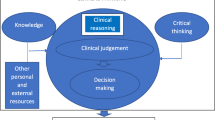Summary
It is not enough for clinicians to gather good patient information and then dictate management plans. If patient education is to be successful, attention must be paid to tailoring educational input to the patient’s particular needs. If the conceptual change approach is followed, patient differences due to factors such as age and culture will be taken into account. Likewise, the different types of patient education described earlier can be accommodated, since the patient and his or her particular needs are always the focus of all medical conversations. The conceptual change approach for patient education potentially can help clinicians avoid the temptation to ignore patients’ perspectives and provide instruction tailored to patient needs, thereby reducing the possibility of educational negligence.
Similar content being viewed by others
References
Eraker SA, Kirscht JP, Becker MH. Understanding and improving patient compliance. Ann Intern Med. 1984;100:258–68.
Annandale EC. The malpractice crisis and the doctor-patient relationship. Soc Health Illness. 1989;1(1):1–23.
Waitzkin H. Doctor-patient communication: clinical implications of social scientific research. JAMA. 1984;252:2441–6.
Ley P. Communication with patients: improving satisfaction and compliance. London: Croon-Helm, 1988.
Simpson M, Buckman R, Stewart M, et al. Doctor-patient communication: the Toronto consensus statement. BMJ. 1991;303:1385–7.
Bird J, Cohen-Cole SA. The three-function model of the medical interview. In: Hale MS (ed). Models of Teaching Consultation-Liaison Psychiatry. Basel: Karger, 1989;65–88.
Lipkin M Jr. The medical interview and related skills. In: Branch WT, Lipkin M Jr. (eds). Office Practice of Medicine. Philadelphia: W. B. Saunders, 1987; 1287–306.
Kleinman A, Eisenberg L, Good B. Culture, illness, and care: clinical lessons from anthropologic and cross-cultural research. Ann Intern Med. 1978;88:251–8.
Kleinman A. The illness narratives: suffering, healing, and the human condition. New York: Basic Books, 1988.
Waitzkin H. The politics of medical encounters: how patients and doctors deal with social problems. New Haven, CT: Yale University Press, 1991.
Maynard DW. Bearing bad news in clinical settings. In: Dervin B (ed). Progress in Communication Sciences. Norwood, NJ: Ablex Publishing, 1991;413–72.
Delbanco TL. Enriching the doctor-patient relationship by inviting the patient’s perspective. Ann Intern Med. 1992;116:414–8.
Roter DL. Physician/patient communication: transmission of information and patient effects. Md Med J. 1983;32(4):260–5.
Hewson MG. Clinical teaching in the ambulatory setting. J Gen Intern Med. 1992;7:76–84.
Hewson PW. A conceptual change approach to teaching science. Eur J Sci Educ. 1981;3(4):383–96.
Posner GJ, Strike KA, Hewson PW, Gertzog W. Accommodation of a scientific conception: toward a theory of conceptual change. Sci Educ. 1982;66(2):211–27.
Beckman HS, Frankel RM. The effect of physician behavior on the collection of data. Ann Intern Med. 1984;101:692–6.
Martin AR. Exploring patient beliefs: steps to enhancing physician-patient interaction. Arch Intern Med. 1983;1143:1773–5.
Toombs SK. The Meaning of Illness: A Phenomenological Account of the Different Perspectives of Physicians and Patients, Vol 42. Norwell, MA: Kluwer Academic Publishers, 1992.
Abramson J, Mayet F, Majola C. What is wrong with me? A study of the views of African and Indian patients in a Durban hospital. S A fr Med J. 1961;35:690.
Price LJ. Metalogue on coping with illness; cases from Ecuador. Qualitative Health Res. 1992;2(2):135–58.
Quill TE, Townsend P. Bad news: delivery, dialogue, and dilemmas. Arch Intern Med. 1991;151:463–8.
Ausubel D. Educational Psychology: A Cognitive View. New York: Holt, Rinehart & Winston, 1968.
Magoon AJ. Constructivist approaches in educational research. Rev Educ Res. 1977;47(4):651–93.
Van Glasersfeld E. Cognition, construction of knowledge, and teaching. Synthese. 1989;80:121140.
Toulmin S. Human understanding. Princeton, NJ: Princeton University Press, 1972.
Lakoff G, Johnson M. Metaphors we live by. Chicago: University of Chicago Press, 1980.
Hewson MG. The ecological context of knowledge: implications for teaching science in the third world. J Curric Stud. 1988;20(4):317–327.
Hewson MG, Hewson PW. Effect of instruction using students’ prior knowledge and conceptual change strategies on science learning. J Res Sci Teach. 1983;20(8):731–43.
Brookfield SD. The skillful teacher. San Francisco: Jossey-Bass, 1990.
Author information
Authors and Affiliations
Additional information
Received from the Departments of Medicine and Pediatrics, University of Wisconsin, Madison, Wisconsin.
Supported by the USPHS/HRSA training grants D28-PE-15218 and DE-PE-55024, and MCHB training grant MCJ-559-072.
Rights and permissions
About this article
Cite this article
Hewson, M.G. Patient education through teaching for conceptual change. J Gen Intern Med 8, 393–398 (1993). https://doi.org/10.1007/BF02600081
Issue Date:
DOI: https://doi.org/10.1007/BF02600081




